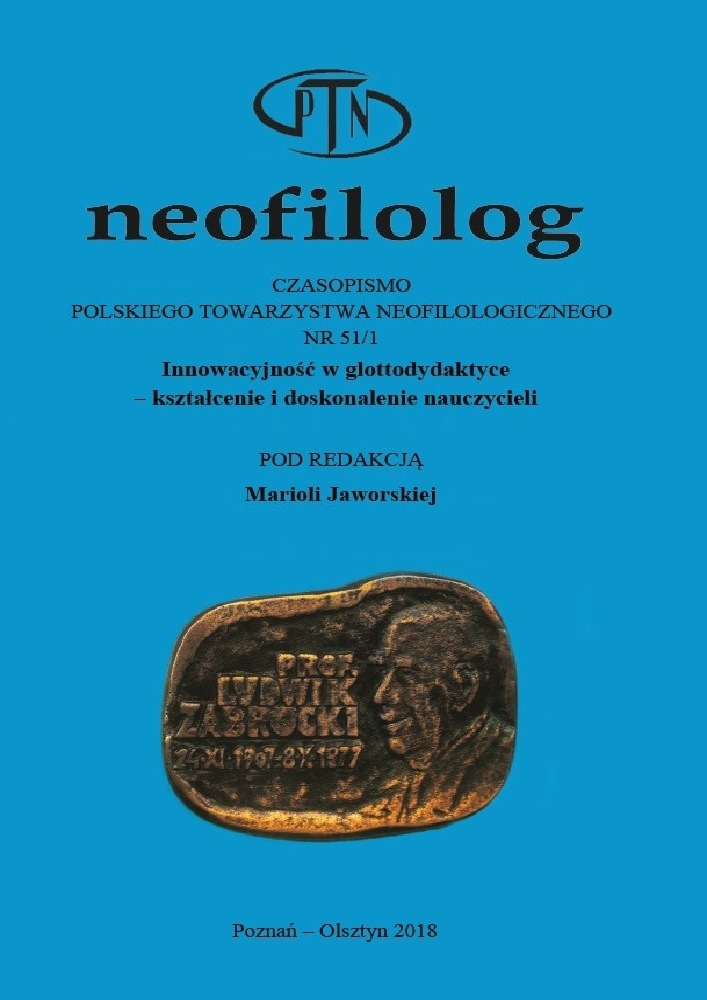Abstract
Innovativeness constitutes one of the core elements of modern ducation development. The phenomenon in question can be analysed in the context of the actions taken by each of the participants of the learning/teaching process. The paper is focused mostly on the teacher’s activity. On the basis of an empirical study, the Authors aim at defining the notion of an innovative teacher, and, more specifically, a language teacher.
Literaturhinweise
Drozdowski et al., 2010. Wspieranie postaw proinnowacyjnych przez wzmacnianie kreatywności jednostki. Warszawa: PARP.
Ekiert-Grabowska, D. 1989. Nowatorstwo pedagogiczne nauczycieli. Katowice: Uniwersytet Śląski.
Jobs, S. 2011. Sekrety innowacji. Kraków: Wydawnictwo Znak.
Kopaliński, K. 2014. Słownik wyrazów obcych i zwrotów obcojęzycznych z almanachem. Warszawa: Rytm.
Okoń, W. 1998. Nowy słownik pedagogiczny. Warszawa: Wydawnictwo Żak.
Pietrasiński, Z. 1970. Ogólne i psychologiczne zagadnienia innowacji. Warszawa:PWN.
Przyborowska, B. 2013. Pedagogika innowacyjności. Między teorią a praktyką. Toruń: Wydawnictwo Naukowe Uniwersytetu Mikołaja Kopernika.
Rusakowska, D. 1986. Nauczyciel i innowacje pedagogiczne. Warszawa: Instytut Wydawniczy Związków Zawodowych.
Schultz, R. 1980. Procesy zmian i odnowy w oświacie. Warszawa: PWN.
Schulz, R. 1992. „Kształcenie dla innowacji pedagogicznych – geneza, sens i zastosowanie idei”. (w:) Kształcenie dla innowacji pedagogicznych (red. R. Schulz). Toruń: Wydawnictwo Uniwersytetu Mikołaja Kopernika, s. 7-14.
Schulz, R. 1994. Twórczość pedagogiczna. Elementy teorii i badań. Warszawa: Instytut Badań Edukacyjnych.
Smak, E. 2014. Innowatyka w edukacji. Opole: Wydawnictwo Nowik.
Zawadzka, E. 2004. Nauczyciele języków obcych w dobie przemian. Kraków: Oficyna Wydawnicza „Impuls”.
Lizenz
Copyright (c) 2019 Ewa Półtorak, Beata Gałan

Dieses Werk steht unter der Lizenz Creative Commons Namensnennung - Keine Bearbeitungen 4.0 International.
Autoren:
Die Autoren der zur Veröffentlichung in der Zeitschrift Neofilolog angenommenen Texte sind verpflichtet, den Vertrag über die Erteilung einer kostenlosen Lizenz für die Werke mit der Verpflichtung zur Erteilung einer Sublizenz CC auszufüllen, zu unterzeichnen und an die Adresse der Redaktion zurückzusenden.
Gemäß Vertrag erteilen die Autoren auf die in der Zeitschrift Neofilolog veröffentlichten Texte der Adam-Mickiewicz-Universität in Poznań eine nicht exklusive und kostenlose Lizenz und erlauben die Verwendung der Sublizenz Creative Commons Attribution-NoDerivatives 4.0 International (CC BY-ND 4.0).
Die Autoren behalten das Recht zur weiteren freien Verfügung über das Werk.
Benutzer:
Interessierte Onlinebenutzer dürfen die seit 2017 veröffentlichten Werke unter folgenden Bedingungen nutzen:
- Anerkennung der Urheberschaft - die Verpflichtung, zusammen mit dem verbreiteten Werk Informationen über die Urheberschaft, den Titel, die Quelle (Links zum Originalwerk, DOI) und die Lizenz selbst bereitzustellen;
- ohne Schaffung abgeleiteter Werke - das Werk muss in seiner ursprünglichen Form erhalten bleiben, ohne Zustimmung des Autors dürfen keine Studien, beispielsweise Übersetzungen, verbreitet werden.
Die Urheberrechte aller veröffentlichen Texte sind vorbehalten.
Sonstige:
Die Adam-Mickiewicz-Universität in Poznań behält das Recht auf die Zeitschrift als Gesamtheit (Layout, Grafik, Titel, Umschlagsprojekt, Logo usw.).

